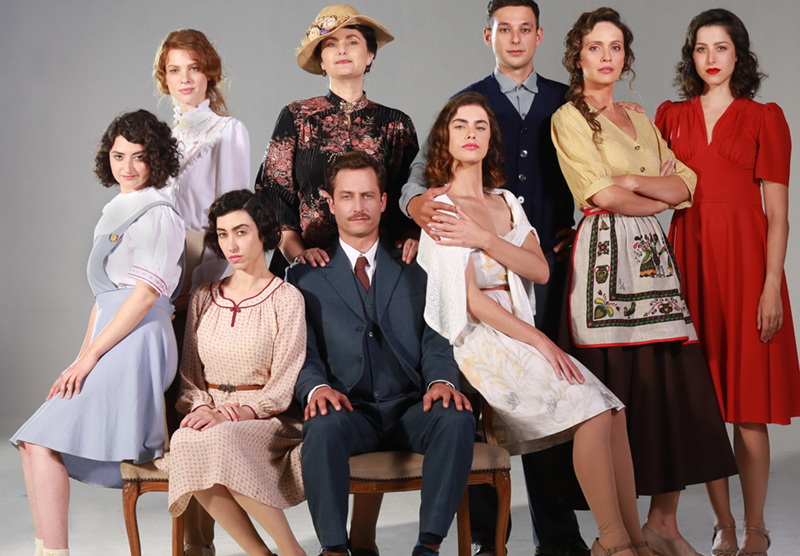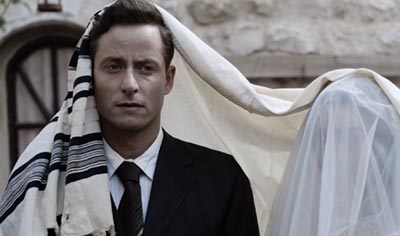Arts
Television
‘The Beauty Queen of Jerusalem,’ a Family Saga in Pre-state Israel

From its opening scenes, the Israeli-made television series The Beauty Queen of Jerusalem sets a dark, compelling tone. It is 1917 Jerusalem, where the Turks are in control. Rosa Siton (played by Hila Saada), a young Sephardic orphan, finds out that her brother, Rachamim, has been hanged for refusing to join the Turkish army. Her cries and screams are chilling when she discovers her brother’s body in Damascus Square.
Taking place during the Ottoman Empire and the subsequent British Mandate, the lavish costume drama centers on the Ermoza family, wealthy Sephardic merchants who own a shop in Jerusalem’s Machane Yehudah. Merkada Ermoza (Irit Kaplan) is the cruel and powerful matriarch of the family. Her son, Gabriel (Shtisel’s Michael Aloni), marries Rosa, and the two have three daughters: Luna, Rachelika and Becky. The series follows the family’s romances and forbidden loves, tragedies and battles in a changing, turbulent time and place.

The long-awaited show, which begins streaming on Netflix in the United States on May 20, is adapted from the beloved international best seller of the same name by Israeli author Sarit Yishai Levi. The book, published in English in 2016, juxtaposed tragedy and comedy, even throwing in a touch of magical realism similar to that in Gabriel Garcia Marquez’s novels. Co-produced by Dafna Penner and Shai Eines for yes TV and Artza Productions, The Beauty Queen of Jerusalem was a smash hit in Israel when it premiered in 2021. That same year, it won several Ophirs, similar to the Oscars, including one for Best Drama. While covering the same basic ground as the book, the series paints a darker, grittier picture of the fighting and violence of the time period.
According to Ester Namdar Tamam, who co-created the series with Shlomo Mashiach and Oded Davidof, this decision was deliberate. “The book has a way of telling dramatic stories in a colorful way,” she said. “The television drama shows more starkness. We added elements that make the result a little darker.” While Rachamim’s hanging is given short shrift in the novel, for example, the series graphically shows its impact on Rosa and their younger brother, Ephraim.
Co-producer Prenner also noted the need to create something original from the material. “The novel has legions of fans,” she said, “and we had to create a series that was, on one hand, based on the book, but on the other hand, stood on its own two feet as a separate creation.”

Shot in Israel—viewers familiar with the Jewish state will recognize the streets of Jerusalem, Safed and other locales—the first season of the series covers 1917 through 1942. Episodes jump to different time periods, interlacing the family saga with the fighting between Jews and Arabs, the tension between Sephardi and Ashkenazi inhabitants of the city and the struggles to create the new nation of Israel. (The second season starts shooting in June.)
“We made an effort to show [all] angles and not tell one truth,” explained Namdar Tamam. “There’s all these narratives that are intertwined in the show,” she added before noting her pride in the way the actors connected to their characters.
Indeed, viewers will appreciate the depth the actors bring to their roles. Each character, from the three main leads—handsome, soulful Gabriel; troubled, unhappy Rosa; and the titular beauty queen, Luna (Swell Ariel Or)—to the minor parts, are impeccably portrayed, and bring the book’s personalities to life.
From an acting standpoint alone, the show is worth watching; from an historical perspective, the series depicts the history of pre-state Israel in a remarkably rich manner. The Beauty Queen of Jerusalem is a complicated, dark and addictive must-see.
Suzanne Dressler is a freelance writer and podcast host of There’s a Word for That!.








 Facebook
Facebook Instagram
Instagram Twitter
Twitter
Karen Sprinkel Ancelet says
Wonderful write up, looking forward to watching it.
Reina Nuernberger says
I have watched the first 10 episodes as shown on Netflix. As an Israeli -American I wish there were an option to see it in Hebrew instead of all captioned. The acting is excellent, but I find it is all done with a negative view of the characters and events.
Chana says
It is possible to watch in Hebrew- you need to change your settings – i think i found it in the “other” option.
Michelle K. says
I loved this series. Hearing some Ladino dialogue was a rare treat.
Myrna Fineman says
Binged it this weekend. Excellent!
Romance Lover says
You can turn off the captions on Netflix, or choose to see captions in Hebrew. Although I don’t know any of the languages spoken in the series, I’m enjoying picking up words here and there of Ladino.
Yes, I agree the characters so far (I have watched 7 episodes) are somewhat sympathetic, but mostly rather unlikeable. I keep waiting for Gabriel, Rosa or Luna to act mature or courageous. I hope there will be some resolution and happy endings for at least some.
Miriam Scaccio says
We watched 20 episodes over the weekend = it was wonderful
Pav Taruschio says
Just finished series 2. I loved it all, even though I watch it through a badly dubbed version, as I live in Wales UK.
I do hope they will make series 3!!
Jessica says
Loved it! It was a great show! Watched it in Hebrew. I learned so many words as I pick up languages quickly.